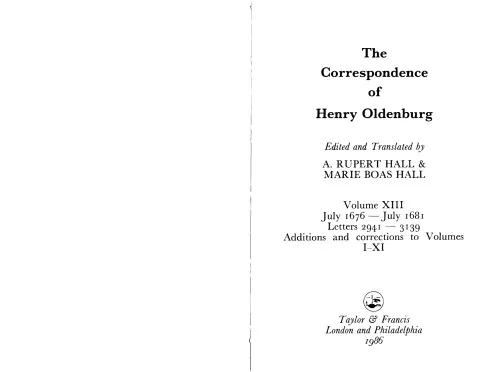The Correspondence of Henry Oldenburg, Vol. 13, July 1676-July 1681: Letters 2941-3139, Additions and Corrections to Volumes 1-11
4.3
Reviews from our users

You Can Ask your questions from this book's AI after Login
Each download or ask from book AI costs 2 points. To earn more free points, please visit the Points Guide Page and complete some valuable actions.Related Refrences:
Introduction to "The Correspondence of Henry Oldenburg, Vol. 13, July 1676-July 1681: Letters 2941-3139"
"The Correspondence of Henry Oldenburg, Vol. 13" is a comprehensive compilation of the letters of Henry Oldenburg, spanning from July 1676 to July 1681. Known for his pivotal role as the first Secretary of the Royal Society, Oldenburg's extensive correspondence offers a profound insight into the scientific revolution of the 17th century. This volume, like its predecessors, serves as a window into the world of early modern science, showcasing exchanges with some of the most esteemed minds of the time, including notable scientists, philosophers, and intellectuals.
Detailed Summary
This thirteenth installment of Oldenburg's correspondence continues to display his significant contribution to the science and philosophy of his time. The letters included in this volume, numbered 2941 to 3139, capture a vivid tapestry of intellectual and collaborative exchanges. They provide a detailed account of scientific inquiries, debates, and discoveries, illuminating the dynamic nature of scientific discourse.
The period from 1676 to 1681 was a time of substantial scientific progress and controversy. Oldenburg's correspondence reflects the era's discussions on topics such as astronomy, physics, and natural philosophy. One can find exchanges with distinguished figures, including Isaac Newton, Robert Boyle, and Gottfried Wilhelm Leibniz, among others. Through these letters, Oldenburg facilitates not only the communication of new ideas but also the resolution of conflicts that arose from differing viewpoints.
Key Takeaways
- The correspondence served as a crucial channel for the dissemination of scientific ideas during a transformative period in history.
- Oldenburg's letters demonstrate the blending of personal relationships and professional discourse, highlighting the collaborative nature of scientific work.
- The volume records vital historical events and scientific breakthroughs, providing context for the ongoing scientific endeavors of the time.
- These letters are invaluable for understanding the development of scientific methods and the exchange of knowledge in the early modern period.
Famous Quotes from the Book
"Correspondence is the essence of collaboration, and through these letters, one can witness the very heartbeat of the scientific revolution." - Henry Oldenburg
"In the constant pursuit of knowledge, no distance stands between minds willing to engage and explore." - Henry Oldenburg
"Each letter a thread, each word a stitch; woven together they form the fabric of understanding and progress." - Henry Oldenburg
Why This Book Matters
"The Correspondence of Henry Oldenburg, Vol. 13" is not merely a collection of letters; it is a historical document that captures the evolution of scientific thought during a period of profound change. Oldenburg's role as a mediator and communicator among the leading scientists of his day cannot be overstated. Through his diligent correspondence, Oldenburg bridged geographical and intellectual divides, fostering an environment where ideas could be shared freely and developed collaboratively.
This volume also serves as an educational resource for historians, scientists, and enthusiasts aiming to understand the origins and progression of scientific inquiry. Additionally, it provides modern readers with a model of effective communication and collaboration, practices that are just as relevant today as they were in the 17th century.
Ultimately, this book is a testament to the enduring legacy of the scientific revolution and Oldenburg's indelible impact on the course of scientific history. It reminds us that progress is built upon the foundations of dialogue and shared insight, a lesson as pertinent now as it was then.
Free Direct Download
You Can Download this book after Login
Accessing books through legal platforms and public libraries not only supports the rights of authors and publishers but also contributes to the sustainability of reading culture. Before downloading, please take a moment to consider these options.
Find this book on other platforms:
WorldCat helps you find books in libraries worldwide.
See ratings, reviews, and discussions on Goodreads.
Find and buy rare or used books on AbeBooks.
1205
بازدید4.3
امتیاز50
نظر98%
رضایتReviews:
4.3
Based on 0 users review
"کیفیت چاپ عالی بود، خیلی راضیام"
Questions & Answers
Ask questions about this book or help others by answering
No questions yet. Be the first to ask!



